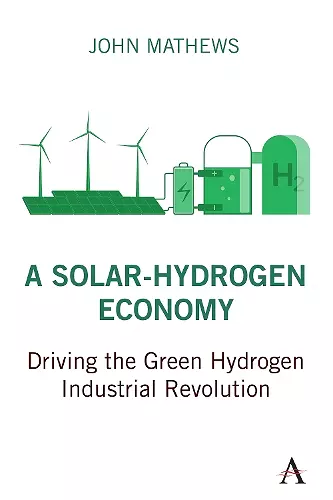A Solar-Hydrogen Economy
Driving the Green Hydrogen Industrial Revolution
Format:Paperback
Publisher:Anthem Press
Published:15th Nov '22
Currently unavailable, and unfortunately no date known when it will be back
This paperback is available in another edition too:
- Hardback£45.00(9781839986413)

Guiding the emergence of a new green economy, based on a green industrial system and on green growth for its propagation, is the core challenge of our time. Efforts so far to switch to renewables in power generation have succeeded in partially transforming energy systems. Efforts to capture the process through imposition of carbon taxes or emissions trading schemes have fallen far short: these are policies based on simplistic comparative static economic frameworks involving changing prices but never engaging with the dynamic industrial drivers of change. A systemic perspective, focusing on the supersession of one technoeconomic system, based on fossil fuels, by another system, based on hydrogen, renewables and circular flows, is called for. The argument is developed that a new politics of energy is evolving from one based on fossil fuels to one where our industrial civilization is maturing and sees the manufacture of energy and energy devices as central to its continued survival.
Journal of Evolutionary Economics
The book offers a nice and very compact introduction to a technoeconomic system likely to be an important component of a future global economic system. —Journal of Evolutionary Economics
“An impressive picture of a world fuelled by green hydrogen (made by solar power from water) for steel, cement, aluminium, chemicals, ammonia for fertilizers and hydrogen fuel cells for all transport. Could it help us escape global warming in time? Read on. It’s fascinating!” – Carlota Perez, Honorary Professor at IIPP-UCL and at SPRU, University of Sussex, Author of Technological Revolutions and Financial Capital: The Dynamics of Bubbles and Golden Ages.
“Mathews presents an urgent, extraordinarily ambitious, but fundamentally possible vision for a new basis for the global economy. The ‘total substitution’ perspective based on solar-hydrogen energy and green industrialization is based on realistic economics and economic history with significant implications for advanced, emerging and developing economies. This is a must-read for policy officials, fund managers, business leaders and electorates.” – Arkebe Oqubay, Senior Minister, Professor of Practice at SOAS University of London.
“This book provides a solution to the challenge of decarbonization through creation of a ‘solar-hydrogen economy’ in which hydrogen, derived from solar power, is the principal energy store and carrier. The book convincingly argues this transformation has the potential to replace the entire fossil fuel economy at sufficient scale and in time. The point is that hydrogen is not a free gift of nature but has to be earned by building a new manufacturing system.” – Keun Lee, Distinguished Professor, Seoul National University; Winner of the Schumpeter Prize.
In this punchy little book, Mathews describes in detail how commodity-based systems, such as fossil fuels, are on their way out. This is because they have limited scope for operational costs to fall. In general, they are subject to diminishing returns to scale: getting more requires accessing remote and costly resources. By contrast, a technology-based system, where renewable energy is extracted at near-zero marginal cost, is replete with economies of scale in discovery and production. Mathews convincingly articulates a dynamic and creative race between green hydrogen and electric batteries to provide the cleaner, cheaper and more secure energy of the future — Dimitri Zenghelis, Special Advisor, Bennett Institute of Public Policy, University of Cambridge, and Senior Fellow, Grantham Research Institute on Climate and the Environment, London School of Economics, UK.
Mathews argues convincingly why the solar-hydrogen economy not only provides a clean and sustainable solution to the climate change conundrum. It also constitutes a green industrial revolution, where green hydrogen will transform the nature of production and transport across our economies. It is not wishful thinking, but a process already in motion — Lindsay Whitfield, Professor of Business and Development, Copenhagen Business School, Denmark.
John A. Mathews simply describes how to pass by the environmental and resource constraints that many believe limit global economic development: Low cost hydrogen from renewable electricity can replace fossil fuels where direct electrification cannot, while also providing balancing of the electricity system. Now we should make it into reality — Professor Tomas Kaberger, Chalmers University of Technology, Sweden, and Foundation Chair, Renewable Energy Institute, Japan.
A must-read guidebook for decision makers in developing countries, which can provide an equal and real opportunity for securing economic growth and prosperity towards a solar-hydrogen economy. Read this book and find suitable policies and strategies for your country and organization! — Professor Mei-Chih HU, Professor at National Tsing Hua University, Taiwan, and Chair Professor at Taiwan’s Ministry of Science and Technology.
With the publication of "A Solar-Hydrogen Economy: Driving the Green Hydrogen Industrial Revolution", Professor John Matthews focuses upon strategies for sustainable development. Guiding the emergence of a new green economy, based on a green industrial system and on green growth for its propagation, is the core challenge of our time. Efforts so far to switch to renewables in power generation have succeeded in partially transforming energy systems — Midwest Book Reviews (John Taylor)
Professor John Mathews has done the maths and his newest book, A Solar-Hydrogen Economy: Driving the Green Hydrogen Industrial Revolution, shows green hydrogen has the capability to completely replace the global, 12-billion tonne, fossil fuel-driven energy system — The Lighthouse.
ISBN: 9781839986420
Dimensions: 229mm x 153mm x 26mm
Weight: 454g
88 pages